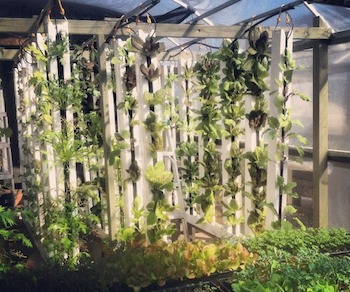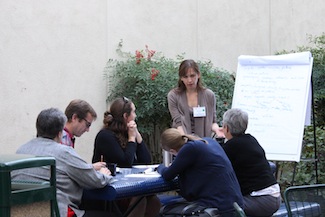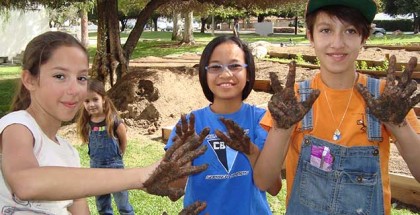Uncategorized
Can Urban Agriculture Thrive in the U.S.? A Look at the Potential of Five Cities to Feed Themselves
February 26, 2016 | Davina van Buren
Food Field is a for profit 4-acre urban farm based in Detroit that was founded in 2010 by Noah Link and Alex Bryan. Photo Credit: Food Field.
Unless you’ve been living under a rock, you know that urban agriculture—the practice of cultivating and distributing food in population-dense areas—is all the rage.
As Americans learn more about our food system and how it affects our health and the environment, many city-dwellers are looking for alternatives to pesticide-laden fruit and vegetables, GMOs and CAFOs.
In response, many farmers have turned to cultivating in cities to take advantage of the market demand for locally grown crops. And ordinary citizens are taking it upon themselves to learn how to grow their own food. Read More
Pro Golfer Leaves Links to Pursue Promise of Greener Urban Farming Pastures
February 25, 2016 | Davina van Buren
Aquaponic green walls (pictured here) are an integral part of Murietta, CA-based urban farming company, Urban Food Works’ business model. Photo courtesy of Mike Lott.
Mike Lott is not your run of the mill farmer. Not long ago, before making the decision to embark on a career in farming and launch his aquaponic and urban agriculture venture, Urban Food Works in Murietta, CA, Lott was a professional golfer.
As a kid growing up in southern California, he didn’t awake early in the morning to milk and feed cows, harvest crops, or turn the soil. Instead, he honed his golf game in anticipation of one day playing professionally. After high school Lott headed to the College of the Desert in Palm Desert not only because of its well-known golf program, but also to study Environmental Science. It was there that the seeds of Lott’s interest in and current passion for urban farming and the environment were sown. Read More
New UC Riverside Enterprise Crosses Disciplines to Improve Local and Global Food Production Systems
February 24, 2016 | AJ Hughes
Participants at a California Agriculture and Food Enterprise planning workshop discuss its future goals and aims. (photo courtesy Don Davidson/University of California, Riverside)
With a strong emphasis on research, the California Agriculture and Food Enterprise (CAFE) at the University of California at Riverside has a mission to improve food production systems, stimulate food and agriculture teaching and develop an interdisciplinary food systems curriculum.
Drawing upon the expertise of faculty and staff from UCR’s College of Natural and Agricultural Sciences, University of California Extension and Agricultural Experiment Station, CAFE aims to link with people from other UCR colleges and departments who work in areas pertaining directly or indirectly to agriculture.
“[CAFE] transcends a single discipline,” says CAFE founder and genetics professor Norman Ellstrand. “People in social sciences are interested in food deserts.” Read More
Agriculture Key to California Economic Summit’s ‘One Million Challenge’ for Workers, Water and Homes
February 23, 2016 | AJ Hughes
Trees are pruned for backyard orchards at Hayes Valley Farm, a community-built farm on San Francisco’s former Central Freeway. Agriculture in both rural and urban areas is a key component of the California Economic Summit’s 2016 roadmap to economic prosperity. (Wikimedia Commons photo)
In November 2015, the fourth California Economic Summit took place in Ontario, located in Southern California’s Inland Empire. Agriculture was a key component of the vision outlined at the event, which is designed to spur economic growth in the Golden State.
The event is put on by the California Stewardship Network, a group promoting economic vitality and California Forward, a bipartisan government reform initiative.
“The first economic summit did not include agriculture, which was a large frustration,” says Glenda Humiston, vice president of University of California Agriculture and Natural Resources and co-lead of the Summit’s Working Landscapes Action Team along with A.G. Kawamura, an urban farmer from Orange County. “The following year, we advocated for a Working Landscapes action team.” Read More
To Break Cycle of Poverty, Uncommon Local Organization Sees Solution in Urban Agriculture
February 22, 2016 | Anne Craig
Photo courtesy of Uncommon Good.
In 2011, Nancy Mintie, founder of Claremont, CA-based Uncommon Good saw in urban agriculture an opportunity to help fulfill her organization’s mission to break intergenerational poverty cycles and give people the tools to lift themselves up. Mintie says her embrace of urban agriculture in Uncommon Good’s ongoing efforts to promote health, wellness, education and sustainability was a matter of leveraging a resource that had been right under her nose.
The seed was planted during the recession.
“We’d been doing education and social services work, and we saw the level of hardship just skyrocket,” she says. “We were seeing a reverse migration since people were now starving here as badly as they had been back home in Mexico.”
Hope was in short supply.
So Mintie started with the idea that a community garden could, at least, get people fed; but her clients had their doubts. Read More
L.A. Food Policy Council Outlines Path to Fresh Food for All in the City of Angels
February 17, 2016 | AJ Hughes
A blighted vacant lot is seen in Los Angeles. Through urban agriculture incentive zones, the Los Angeles Food Policy Council wants to see more vacant blighted land transformed into thriving urban farms and gardens. (Photo courtesy Camille de la Vega/Los Angeles Food Policy Council)
Imagine a world-class metropolis where people take their relationships with food so seriously that all citizens enjoy access to farmers’ markets. The notion of food waste is obsolete (instead, think food capital). Farms and gardens thrive where vacant lots once languished and the streets are alive with an astounding variety of food vendors.
That’s a vision that the Los Angeles Food Policy Council (LAFPC) is working hard to make a reality in the City of Angels. To make food access more equitable for all, LAFPC is stressing four equity initiatives which focus on urban agriculture incentive zones, sidewalk food vending, food waste recycling and compost, and accessible farmers’ markets. Read More
Team Led by UC Riverside Scientist Receives $4 million Grant to Fight Disease Devastating Citrus Industry
February 10, 2016 | Sean NealonPress Release – RIVERSIDE, Calif. (www.ucr.edu) — A team of researchers led by a University of California, Riverside scientist has been awarded a $4 million grant from the U.S. Department of Agriculture in an attempt to save the United States citrus industry from a disease that has already devastated the industry worldwide.
Huanglongbing (HLB), also known as citrus greening disease, is a bacterial plant disease fatal to citrus trees. The disease has devastated citrus trees in Asia, South America and Florida. More recently it has been found in Texas and California.
“This disease is getting more and more scary because we have no cure,” said Wenbo Ma, an associate professor of plant pathology at UC Riverside and lead researcher on the project. “Once a tree is infested all a grower can do is watch it die.” Read More
USDA Awards $20 Million in Grants for Citrus Greening Research; UC Riverside Among Recipients
February 9, 2016 | USDA USDA Press Release – The U.S. Department of Agriculture (USDA) today awarded $20.1 million in grants to university researchers for research and extension projects to help citrus producers fight Huanglongbing (HLB), commonly known as citrus greening disease. This funding is available through the Specialty Crop Research Initiative (SCRI) Citrus Disease Research and Extension Program (CDRE), which was authorized by the 2014 Farm Bill and is administered by USDA’s National Institute of Food and Agriculture (NIFA).
Press Release – The U.S. Department of Agriculture (USDA) today awarded $20.1 million in grants to university researchers for research and extension projects to help citrus producers fight Huanglongbing (HLB), commonly known as citrus greening disease. This funding is available through the Specialty Crop Research Initiative (SCRI) Citrus Disease Research and Extension Program (CDRE), which was authorized by the 2014 Farm Bill and is administered by USDA’s National Institute of Food and Agriculture (NIFA).
“Citrus greening has affected more than 75 percent of Florida citrus crops and threatens production all across the United States,” said Secretary Tom Vilsack. “The research and extension projects funded today bring us one step closer to providing growers real tools to fight this disease, from early detection to creating long-term solutions for the industry, producers and workers.” Read More










